THC Conference and Workshop Presentations July - December, 2024
July, 2024
21st NR-SIG-WFNR Conference
June 30 - July 1, 2024, Coimbra, Portugal
The NR-SIG is for clinicians and researchers in a multitude of disciplines interested in the rehabilitation of people across the lifespan with cognitive, emotional, psychosocial and behavioural deficits caused by acquired brain injury or neurological disease (both progressive and nonprogressive). Research Assistant and PhD Candidate, Chelsea Marsh, attended the 21st NR-SIG-WFNR Conference in June/July, 2024. She presented the speech and poster, entitled: "An Immersive Virtual Reality Game to Identify Spatial Neglect: The Full Story From Conception & Piloting, to Efficacy & Implementation Analyses." Chelsea’s presentation provided an overview of the full study from idea generation to implementation, describing the process by which the research team created an immersive virtual reality (VR) game to assess for spatial neglect following stroke: The Attention Atlas (AA). Over 4 years, the team have piloted, and evaluated the efficacy of the AA, as well as conducting usability and implementation analyses to understand the potential for clinical uptake.
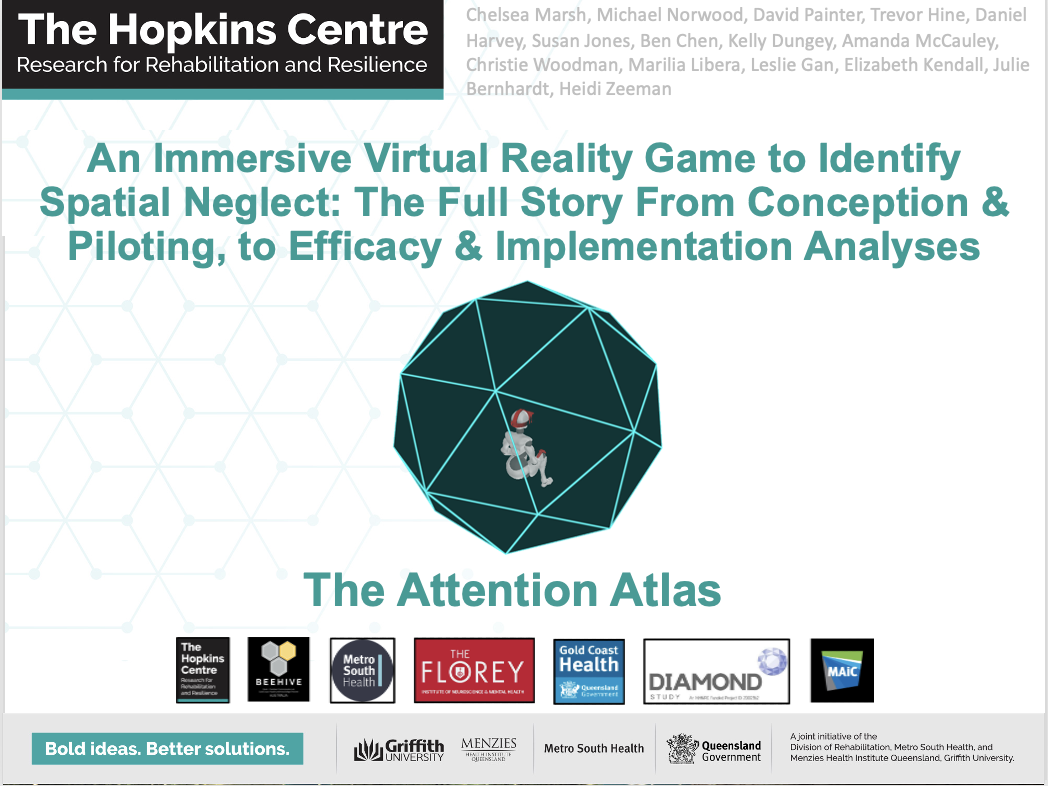
August
Queensland Trauma and Burns Quality Insurance Committee (QTBQAC)
Centre Director, Professor Tim Geraghty, presented at the Queensland Trauma and Burns Quality Insurance Committee (QTBQAC) during August. The panel discussions were very productive raising a number of key issues on the gaps with managing the psychological impact of trauma.
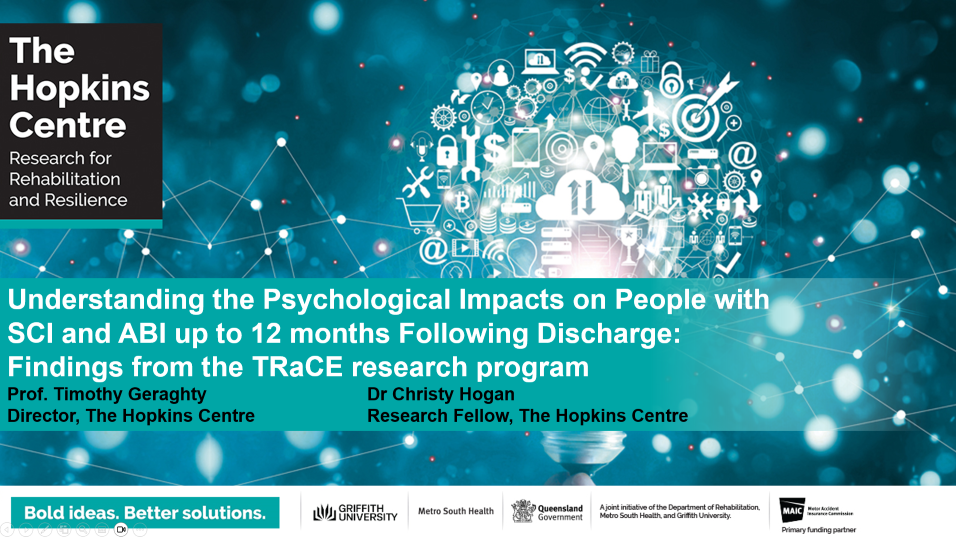
September
INSWABI 2024
September 18 - 20, Adelaide, SA
Dr Annerley Bates and Dr Jessie Mitchell delivered a workshop on Reclaiming Agency in Care Decisions after Brain Injury at the International Network for Social Workers in Acquired Brain Injury (INSWABI) 2024 Symposium held in Adelaide. The interactive workshop was attended by ≈30 social workers and service providers, who reflected on their own practices and developed a toolbox of scaffolded strategies to encourage agency in care decisions among individuals with brain injuries and their family members.
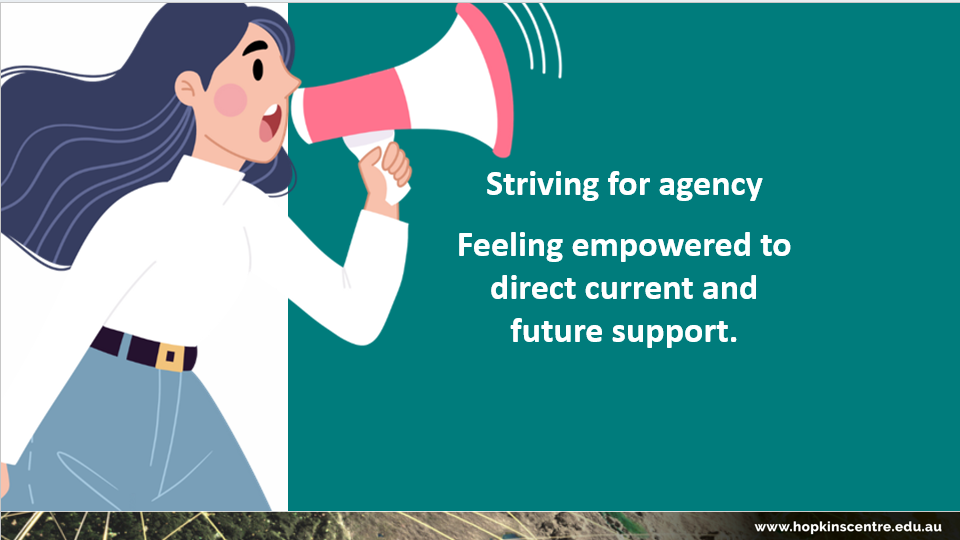
Training Neuropsychological Rehabilitation in the US
September 17-21, Michigan, USA
From September 17th to 21st Professor Tamara Ownsworth was invited Faculty for the Saugatuck Institute of Neuropsychological Rehabilitation (SINR) in Michigan. SINR grew out of a commitment to advance the practice of neuropsychological rehabilitation internationally through intensive hands-on clinical teaching in the formulation, application, and integration of interventions for both cognitive and emotional consequences of acquired brain injury. Prof. Ownsworth has been an invited international faculty member for SINR since 2023. This year she co-facilitated the “Awareness and Insight after brain injury” training session with Dr Pamela Klonoff from the Barrow Neurological Institute in Phoenix, Arizona. Prof. Ownsworth also delivered a series of workshops focused on improving self-awareness and self-regulation skills after brain injury for neuropsychologists, speech and language therapists, and occupational therapists.
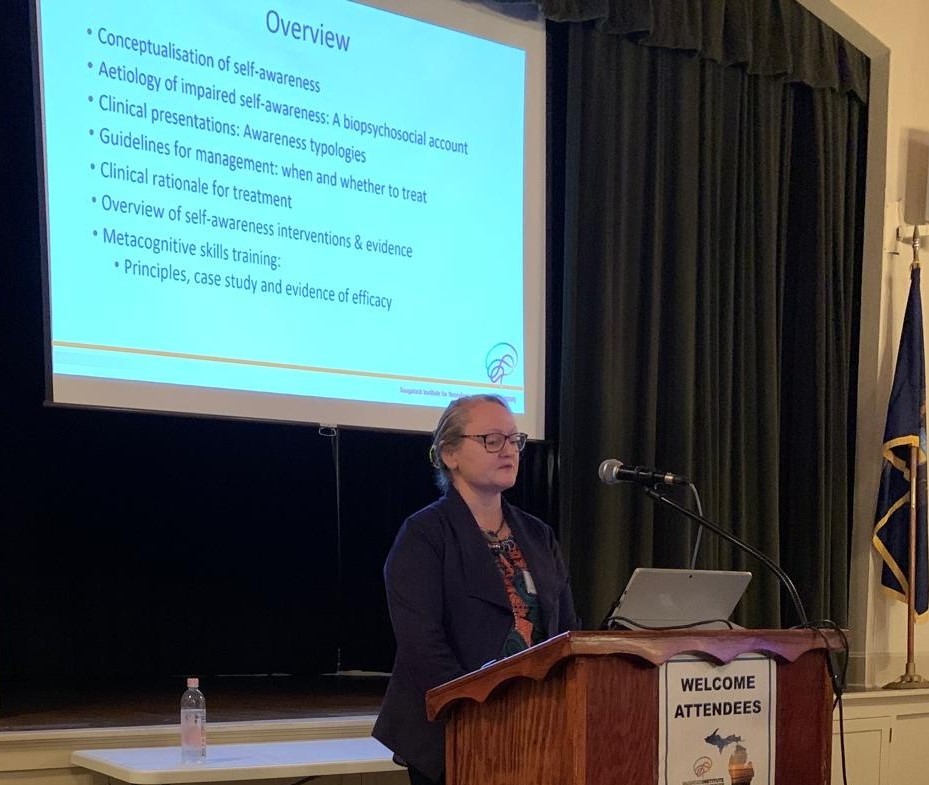
November
Australian Assistive Technology Conference
November 6-8, 2024, Gold Coast, AUS
Hopkins Centre researchers attended the 4th AATC 2024.The conference took place at the Gold Coast Convention Centre from November 6-8th, 2024, with the theme “Sun Sea and AT: the rising tide of innovation and inclusive technology". This two-day conference was a hub of insightful discussions, knowledge sharing, and networking opportunities for professionals and enthusiasts in the field of assistive technology.
Dr Rachel Brough presented a poster on a metasynthesis study of qualitative literature that aimed to understand the experiences of people with spinal cord injury (SCI) and how assistive technology (AT) supports their higher education and work goals. Findings showed the importance of considering person-job-AT fit at all stages of AT provision and use.
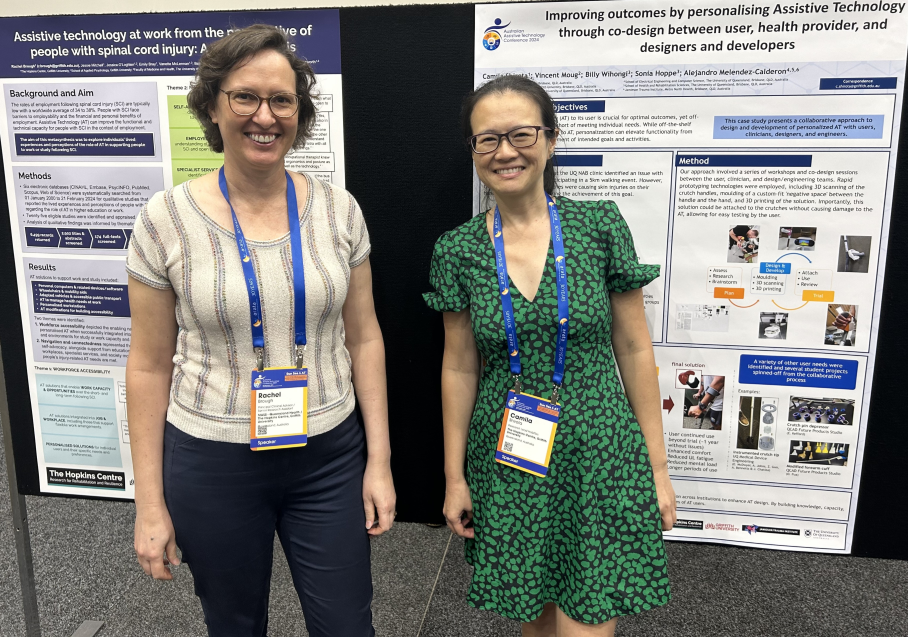
Dr Camila Shirota and Matt McShane PLY gave an overview of the VisADLs project. Their presentation provided a background and motivation for the project. They also provided in more detail how the diverse team, involving researchers who represent some of the anticipated end-users, is utilising a range of design research tools in an iterative process. They also provided a demonstration of the prototype tool that has been developed. Other project members: Louise Gustafsson, Rachael DiMichele and Liz Ainsworth (session chair) were also attending the conference and at the presentation. This presentation was part of a larger session about home modifications, showcasing a range of new technologies that are available, which the team were pleased to see was well attended.

Jayke Bennett presented a poster from the Virtual Reality (VR) Nature Project on behalf of the BEEHive team, which included investigators Dr Michael Norwood, Chelsea Marsh, Professor Louise Gustafsson, and Sue Jones. The project purpose was to examine whether showing people nature scenes through a VR headset improves their psychological wellbeing following an acquired brain injury (ABI). Participants were recruited from the Neurosciences Rehabilitation Ward at Gold Coast University Hospital. Videos were shown three times a week for two weeks and several significant local locations were shown (one on each day) – Burleigh Heads, Tallebudgera Creek, and Springbrook National Park. The findings show a decrease in reported stress and depression following at least 1-week of VR Nature compared to rehabilitation as usual, and most people reported feeling better immediately after a VR Nature video. Qualitative findings support a desire for VR Nature to be offered as a stress-relief tool throughout rehabilitation.
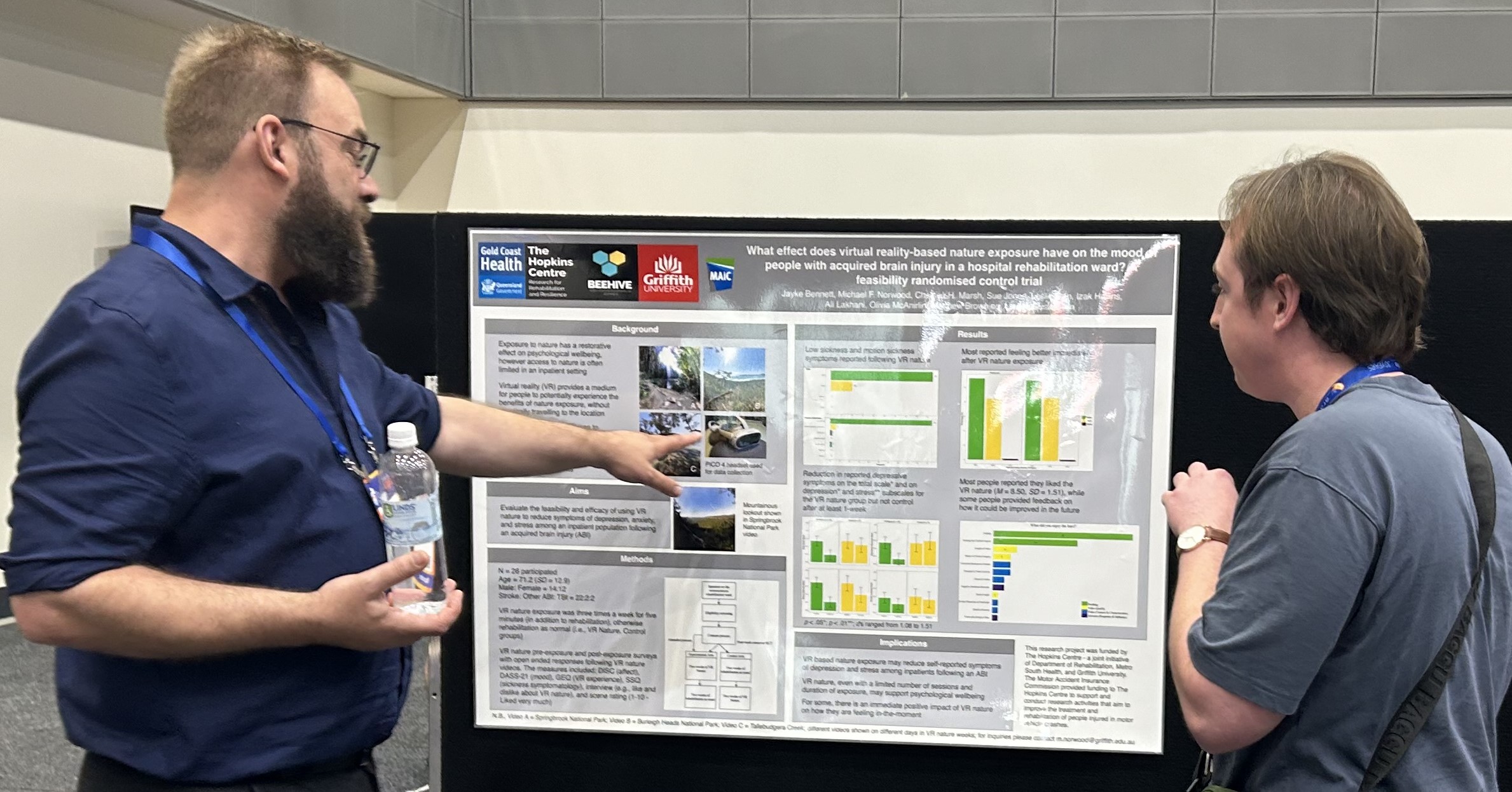
Queensland Brain Injury Collaborative (QBIC) 2024 symposium
19 November 2024, Brisbane
The Hopkins Centre leaders and researchers attended and presented at the QBIC annual symposium, coming together to collaborate and showcase multi-discipinary brain injury research.
Professor Louise Gustafsson presented on navigating the road to recovery and what that looks like for driving and community access following brain injury.
The Hopkins Centre researchers are proud members of the QBIC network, collaborating on several acquired brain injury (ABI) projects and research-led initatives, to improve care, oucomes and sustainable rehabilitation solutions for people with ABI and their support networks.
Australian & New Zealand Spinal Cord Society ANZSCoS2024 Annual Scientific Meeting
27-29 November 2024, Fremantle, WA
The Hopkins Centre researchers attended and presented at the ANZSCoS conference from 27-29 November.
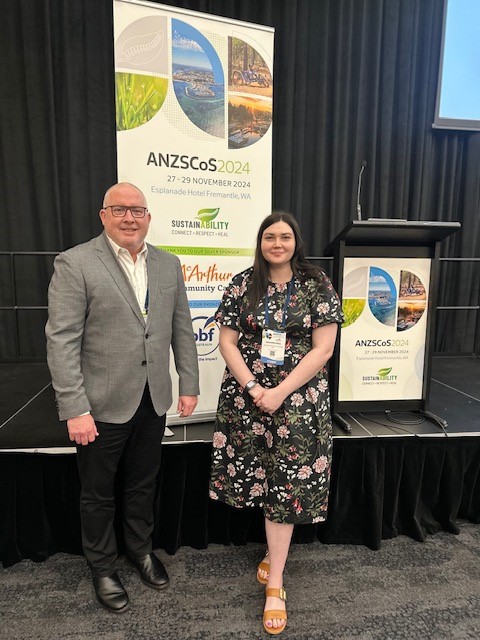
The Hopkins Centre Director, Tim Geraghty presented Hopkins research work relating to the InSCI Community Survey project, focusing on unmet healthcare needs for people with spinal cord injury (SCI) in Australia. He spoke about the prevalence of unmet healthcare needs for people with SCI in Australia and how provider experiences were related to these unmet healthcare needs.
He also presented new research from the TRaCE 3.0 research program on behalf of Hopkins Research Fellow Emily Bray, who unfortunately was unable to attend the meeting in Fremantle. The presentation titled “Setting me up or holding me back?: the perspectives of people with SCI on rehabilitation support at inpatient discharge and 3 months post-discharge from hospital” aimed to understand individuals’ priorities for rehabilitation and their hopes and expectations for post-discharge rehabilitation supports at the time of discharge. It was found that rehabilitation supports in the initial transition phase needed to be flexible and responsive to participants’ changing goals and priorities in the context of diverse discharge pathways and transition support needs.
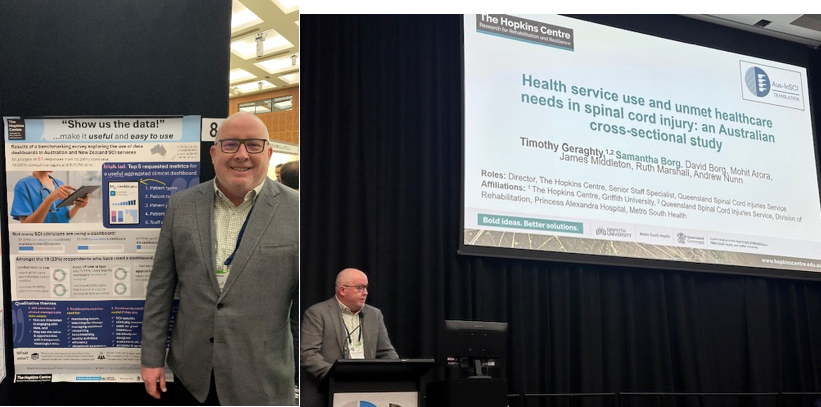
On behalf of Hopkins Centre Clinical Fellow Emily Allan, Tim also presented a poster about Emily’s clinical fellowship research, called “Show us the Data…make it useful and easy to use” which shared results of a benchmarking survey exploring the use of data dashboards in Australian and New Zealand SCI Services.
Hopkins Senior Research Assistant Samantha Borg presented work on two opioid-focused studies. Her recent research focus area has been on the limited amount of known information about opioid prescribing after SCI in Australia. The first presentation, based on early TRaCE program data provides a better understanding of pain medication dispensing behaviours in the 12-months after a SCI. She also presented on an overview of “Queensland community opioid dispensing after SCI – a data linkage study”, which is part of her PhD (through QUT) program of work . This work provides an important step for clearer understanding of opioid practices and aims to ensure better patient safety around opioid dispensing.
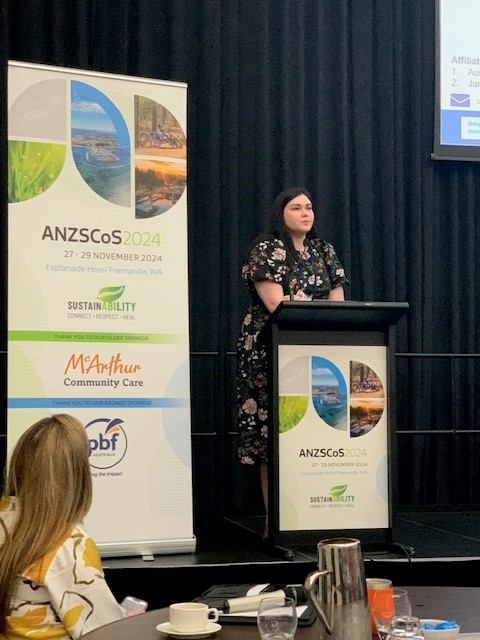
Soo Oh, Project Manager for the HAbITec lab and Senior Occupational Therapist in the Spinal Injuries Unit at Princess Alexandra Hospital presented further research work on HabITec, in a presentation called ”A technology-focused service within a rehabilitation setting – the HabITec Lab”. She also presented a poster titled ‘Exploration of boxing glove bandaging and Coban bandaging to reduce oedema in the hands of people with Tetraplegia: A mixed methods study’.
This important research presented by Hopkins members aligns closely with the objective of ANZSCoS, who are dedicated to research, innovation, education, service delivery, improvement, and advocacy in the area of spinal cord injuries. These research presentations and projects demonstrate The Hopkins Centre's continued committment to bold ideas that can translate into better solutions for people with disability, their supports and the rehabilitation sector.
Tags: Conference 2024, Conference Presentation

